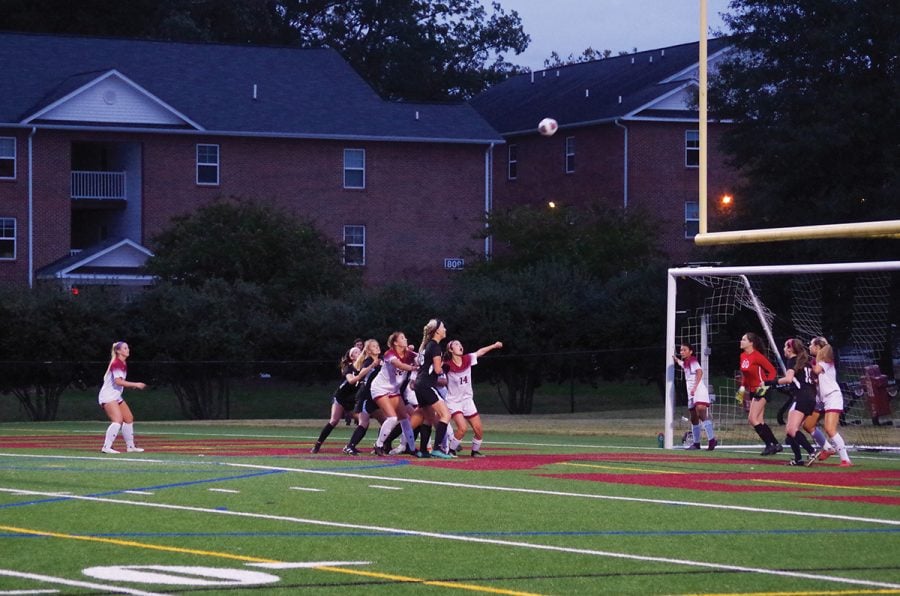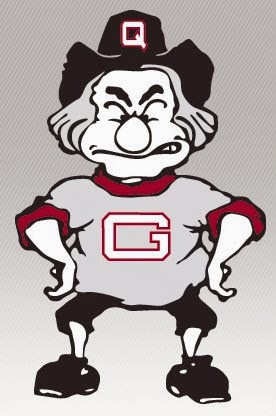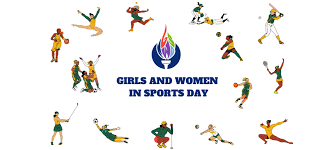Women’s soccer wraps up 2018 season
Guilford women’s soccer players defend a corner kick by Randolph-Macon College.//Photo by: Andrew Walker/The Guilfordian
The Guilfordian is committed to fair and accurate reporting. The initial publishing of this article failed to include the perspective of head coach Stephanie Webb, who was not properly contacted before this article’s release. The article has since been updated with perspectives from coach Webb along with redshirt-senior Ana Fokas.
Head coach Stephanie Webb recently finished her second season as the head coach of Guilford College’s women’s soccer team, with a similar showing to last season.
The Quakers finished 6-10 overall, 4-6 in Old Dominion Athletic Conference play, placing ninth in the conference. This is Guilford’s third consecutive season with six wins and a win percentage under .500.
“Coach Webb and Coach (Asia) Laudal have always been helpful and welcome you with open arms,” said sophomore goalkeeper Morgan Malikowski. “Even though we have not had the results we’ve wanted, we have progressed significantly as a team from last year. The more time we work together as a team, we could be lethal in the ODACs.”
Guilford did a great job sharing the wealth. Of the 23 goals scored over the course of the season, 16 came off assists. Senior forward Juliana Evans-Anfom, junior forward Susan Dillinger, junior midfielder Kelsey Reilly and first-year midfielder Karol Jaimes all-tied for a team-high three goals scored the season.
First-year Aubrey Gunther was the primary goalkeeper for the Quakers, starting in each of her appearances and clocking over 624 minutes in goal. Malikowski started two of her five games as a goalkeeper, earning two shutouts and an .857 save percentage.
The team had a slow start to the season, dropping their first three games, which included a 1-0 overtime loss to crosstown-rival Greensboro College in the season opener. It did not take the Quakers long to turn things around. Guilford won four out of its next five games following the 0-3 start, scoring nine goals and only allowing five during the streak.
“Our season was very up and down,” coach Webb said. “I strategically put a harder (out of conference) schedule because I wanted to test us. I knew it was going to be tough, but games were close, and we were very competitive, so I was very proud of them.”
Senior defender Morgan Wolfe reemphasized this.
“I would say our strength this season was our team as a whole,” Wolfe said. “Even though our record does not show it we competed with the top teams in our conference.”
Guilford struggled on the road this season. They finished 2-6 in away games, and the two victories were over Hollins University and Sweet Briar College. Both finished at the bottom of the conference standings.
However, the road game against Sweet Briar was one of the Quakers’ best showings this season. They won 9-0 and seven different Quakers scored. Evans-Anfom and Jaimes had two goals apiece.
Some of the Quakers’ struggles this past season showed statistically in the ODAC. Guilford ranked 10th with a 1.80 goals allowed average and 16 assists. Discipline was a major factor also, as the Quakers finished second in the league with 10 yellow cards.
A leadership group was established for the team, where five team members were elected as leaders who managed small groups of the other players. The leadership group was selected by the coaching staff and each player was offered an opportunity to apply. The leadership group was used in place of captains.
“When you say “captains,” it comes with too much empowerment and that’s something we didn’t want to portray,” coach Webb said. “In general, I think when people are named “captain,” it makes others not want to have a voice. We wanted our leadership group to be a bridge between the coaching staff and the players.”
But some players on the team noted that the leadership group’s role caused a social divide between the team that may have impeded the team’s chemistry, affecting their play across the 2018 season.
“I believe that the main struggles with the team chemistry stemmed from a divide created by having a leadership group,” said senior midfielder Lauren Culler. “This was supposed to be in place of captains, as there was too much of a stigma associated with the term ‘captains.’ However, this group was shown blatant favoritism and responsibilities of the coaches were passed on to them.
“They met with coaches for hours every week, had their own group chat, and were even called to come to Guilford before others had gotten on campus for a meeting. Punishments for members of the leadership group turned into whole team punishments with much discretion regarding those at fault, while punishments for team members outside of the group resulted in punishment for only those individuals in front of the rest of team.”
Culler lettered four years for the Quakers and scored seven goals, including two game winners, while allocating 21 points in her collegiate career.
“Many players on the team felt as if it was an ‘us vs. them’ situation, even though the leadership group believed that they were very inclusive and that they were simply relaying messages from the coaches,” Culler said. “In addition to the leadership group, there was a clear need for diversity training. While many members of the team came from predominantly white areas or schools, they lacked respect for others. Some members of color even quit because they were so uncomfortable with the team dynamics and knew that the efforts of the program were not yet having an impact on many individuals.
“There are many things that cannot be taught and implemented in one or two trainings. That simply is not enough.”
Coach Webb claims that the team underwent four diversity training sessions over the course of her year and a half span on the campus.
“We have done five different diversity training activities with Krishauna Hines-Gaither because I see it as so important to our program and our program’s development,” coach Webb said. “It’s something that is very passionate to me. I’ve embodied myself around different cultures.
“Educating myself by being around different cultures and races is important to me because it helped me grow as a person. Ultimately, we are trying to do that as a coaching staff. But people come in and they are 18-years old and they’ve come from completely different background. So trying to get that education while going to school, while being a part of the soccer team and while doing all these different things across campus is very difficult.”
An incident occurred in a game this season where a Guilford player used racial remarks as banter toward a player on an opposing team. The player’s comments made other Quakers on the team feel uncomfortable, even to a point where one player quit.
“What was said was by a person who had not been to all the diversity training sessions we’ve had as a team,” redshirt-senior midfielder Ana Fokas said. “When the incident happened, before the coaches or leadership group was aware, we had some players step up and say “hey, that’s not cool or that’s not okay.” But after that incident, we had a zero-tolerance policy for discrimination.”
The diversity training sessions, in Fokas’ opinion, were beneficial to the team’s growth.
“Mostly, we just enjoyed them,” Fokas said. “Krishauna’s really awesome and was fun to work with. She actually reached out to us to help other teams with diversity training. It was really cool that we had something that really brought us together. It helped us see each other’s strengths and how we could use them in our game.”
Wolfe was more optimistic about the state of the team’s chemistry.
“Team chemistry is hard, being a fall sport,” Wolfe said. “Our (first-years) are just thrown in without an offseason to get to know us like the spring sports have. With that being said, I think we had pretty good chemistry on the field. While there were some bumps in the road along the way, I think our team handled them pretty well.”
Still, Wolfe mentioned that the issues existed, but downplayed their effect on the team’s season.
“I think bringing a group of over 25 girls together, you are going to have issues off the field, but we try to make it very clear that any off the field issues no longer matter when you step on the field,” Wolfe said. “Overall, I believe that we did a decent job separating off-the-field issues. I don’t think those were a huge, deciding factor on how the season ended.”
Coach Webb expressed other factors that could have hindered the team’s chemistry.
“Our team is from a lot of different backgrounds,” coach Webb said. “When you haven’t been exposed to diverse groups, it’s always going to make personalities clash. At the same time, they all share their love of soccer. So for me, I definitely saw (chemistry struggles) more off the field because people’s interests were very different, and that’s okay.”
For Malikowski, it takes each player’s individual efforts to be complete as a team.
“I believe that with any sport, especially with girls, that not everyone is going to mesh perfectly,” Malikowski said. “It depends on the effort that individuals want to put into making themselves, and the team as a whole, better.”










Sami Bennett • Dec 21, 2018 at 11:23 pm
As a former team member o can say that a big part of my decision to not return was due to team dynamics. It was a hostile environment, one that almost generates ignorance. For example on multiple occasions white women’s soccer players have used the n word and have received no reprimand for their dangerous behavior. The players break off into groups excluding others, and created a power dynamic that would create a place for players to bully and intimidate other players . I believe that the Guilford women’s team has a long way to go before they can call themselves an inclusive team that is a safe environment. Because I did not feel safe which is why I left.
Ana Fokas • Dec 1, 2018 at 1:31 pm
This article does not represent Guilford women’s soccer and the positive impact the program brought to our Quaker community. If the Guilfordian wanted opinions it would be more beneficial to survey a broader range of team members.